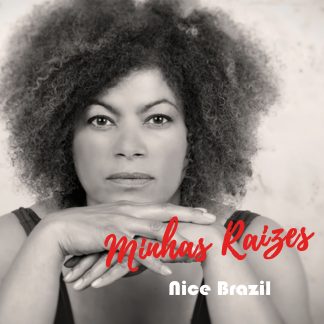 Her stage name says it all: The singer Nice Brazil stands for the enchanting sides of Brazilian music. From the rhythms that makes the legs move, to melodies that touch you, to lyrics that sometimes take you on a melancholy walk, sometimes on a full ride of joie de vivre. Her new album “Minhas Raizes” (“My Roots”) consistently continues what she recently pre-explored on “Pra Voce” (“For You”): she pours all the riches of Brazilian music, from traditional choro or baião to Samba and Bossa-Nova, the different styles, sounds and colors of big cities like Sao Paulo, Rio or Belo-Horizonte in jazzy arrangements. For the first time mainly with own compositions and in her own words.
Her stage name says it all: The singer Nice Brazil stands for the enchanting sides of Brazilian music. From the rhythms that makes the legs move, to melodies that touch you, to lyrics that sometimes take you on a melancholy walk, sometimes on a full ride of joie de vivre. Her new album “Minhas Raizes” (“My Roots”) consistently continues what she recently pre-explored on “Pra Voce” (“For You”): she pours all the riches of Brazilian music, from traditional choro or baião to Samba and Bossa-Nova, the different styles, sounds and colors of big cities like Sao Paulo, Rio or Belo-Horizonte in jazzy arrangements. For the first time mainly with own compositions and in her own words.
“Minhas Raizes” is an expression of acquired inner strength, musically the connection of Brazilian music with jazz, thematically no less than the reflection on our time, about life and death. All of this is already gathered in “Pra Lá e Pra Cá” (“Scattered”), the title track “Minhas Raízes” is a tribute to her ancestors, in “Quando Te Vi” (“When I saw you”) she beats down profoundly the phenomenon of the first great love, in “Te Amei” (“I love you”) she says a last farewell to her deceased father. Her expressive voice dances between the extremes: sometimes full of spirits, sometimes very quiet, almost meditative, on the border to the breathy, yet present in every note – she intones the soul of Brazilian music. Intimate moments, but at the same time a moment of thanks to the universe, which she shares with the listener.
Nice Brazil grew up in São Paulo in the 1970s and 1980s. In the heyday of Música Popular Brasileira, which is ubiquitous on the radio, on the streets and at festivals, and is supported by its greatest performers such as Chico Buarque, Geraldo Vandré, João Bosco, Antonio Carlos Jobim, Luis Bonfá, Gilberto Gil or Caetano Veloso. Which was at the same time a protest movement against the military dictatorship, a rebellion by means of music and poetry. Nice began as an actress, in children’s musicals and the theater, soon discovering her passion for singing. Like so many Brazilian musicians, she left her homeland – she has been living in Germany since the beginning of the 1990s and has since become part of the new guard of the European representatives of Brazilian music.
She has always sought to use all vocal expressions for her personal interpretation of Brazilian music. She also took lessons with the opera singer Manuela Soto Nicolás, lecturer at the Musikhochschule Stuttgart as well as the choirmaster (inter alia, the Missa Crioula), composer and arranger Luis Craff Zevallos, with jazz and opera singers. At the Federal Academy for Musical Youth Education Trossingen she studied physiology and development of voice, but also attended seminars and workshops in acting and voice training in her old homeland, amongst others including Dulcemar Vieira and Nelson Machado. She took part in various music projects, organized concerts and other cultural events. She composes, arranges and produces her own music projects. The present album is her fourth.
She is passionate about her pedagogical work, where she teaches children and teenagers the joy of singing – and has now been traveling with her own band for over 15 years. In clubs and at major festivals such as the International Stuttgart Jazz Festival, the Tollwood Festival Munich, the Festival Viva Afro Brasil in Tübingen, the Jazz Week in Burghausen or the Festival da Jazz in St. Moritz.
In addition, Nice already worked with outstanding exponents of Brazilian music, including the legendary drummer Portinho and the pianist Klaus Mueller, who, among others collaborated with Leny Andrade and Herbie Hancock. Both are stars of the New York Brazil jazz scene.
For the album “Minhas Raizes” Nice Brazil has gathered a kind of all-star ensemble around:
On the guitar, the Brazilian guitarist João Luis Nogueira Pinto, who was honored as the best instrumentalist at the federal competition BDMG Cultural in Brazil. Not only does Pinto light up his instrument with elegant chords and sparkling runs, but he also worked out the arrangements with Nice and contributed two of his own compositions: “Samba da Fonte” and “U.T.I.”.
At the piano you can hear Ricardo Fiuza, originally from Belo Horizonte, he studied with Scott Kinsley at the Musicians Institute in Los Angeles and with Miles Davis keyboardist Adam Holzman in New York.
Joel Locher on the double bass is known for frequent recordings, concerts and tours throughout Europe.
St. Petersburg-born Valery Brusilovsky on drums graduated from St. Petersburg College of Music. He played with numerous rock and jazz bands at festivals in Russia and Europe and is also one of the most sought after studio musicians in Germany.
Guests also featured on CD “Minhas Raízes”: the Baden-Württemberg Jazzpreis awardee Korean musician Gee Hey Lee, based in Stuttgart, on the six-stringed electric bass, Franco Petrocca, from an Italian jazz musician family, Brazilian percussionist Edmundo Carneiro, on cello Matthias Trück, who conducts an annual cello festival with international masterclasses and concerts.
As a guest, the great Frankfurt based Hungarian saxophonist Tony Lakatos contributes on two pieces. A ballad specialist and big-band veteran with over 300 album participations, who played with countless European and American jazz greats
Perfectly harmonious and with many solos and elements from the wide-spread jazz pool, these experts prepare the ground for Nice Brazils expressive, variable voice. And her very personal idea of what has become known to the collective musical memory of people worldwide as Brazilian music. Her roots.

